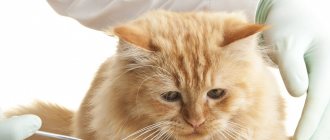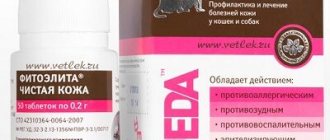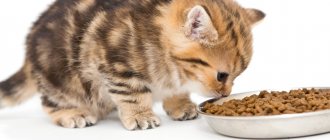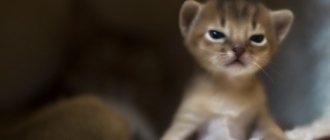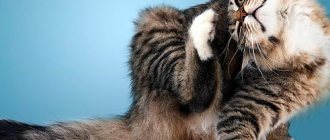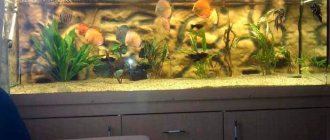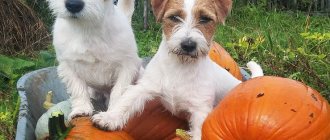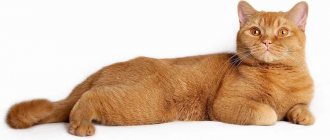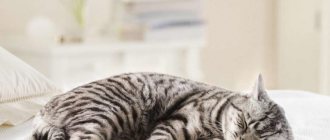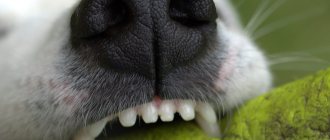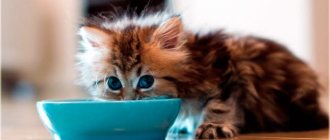Vitamins for kittens: why they are needed and which ones are better to choose
Mischievous and playful kittens always bring a lot of joy to the house and brighten up even the most dull days. With their soft fur and gentle purring, these babies can cheer up almost anyone. But how can you ensure that your kitten develops properly and doesn’t get sick? After all, the health of a small cat is very fragile. In order to build strong immunity in the fluffy ball’s body from the very first months of life and help the kitten grow into a healthy and cheerful cat, it is necessary to give it special vitamins for kittens . Of course, we should not forget about care, proper and varied feeding.
Causes of vitamin deficiency
For the first 1 - 1.5 months after birth, newborn kittens receive enough vitamins from their mother's milk. The first portions of cat milk (colostrum) contain not only a large amount of vitamins, but also many essential proteins, including enzymes and immunoglobulins. It is colostrum that protects kittens in the first months of life from various diseases and vitamin deficiency. But gradually the kittens’ needs increase, and the vitamins in cat’s milk are no longer enough for them, especially when the cat has a lot of cubs. By this time, babies have not yet had time to get used to regular food, so there is a risk of developing hypovitaminosis.
For prevention, you should start giving vitamins from about the 45th day of life. Some forms of vitamins (in drops) can be used even in newborn kittens , who have an increased risk of vitamin deficiency.
Is it possible to take it daily?
Despite the fact that most ready-made vitamins are used for prevention, you should not give them to your animal every day. This especially applies to those animals that eat high-quality dry and wet food, since they already contain a balanced complex of minerals and vitamins. Increasing the dosage with additional tablets is not only unnecessary, but also dangerous: this can lead to hypo- and hypervitaminosis, that is, to an overdose.
Usually, excess vitamins are eliminated from the body naturally, but large dosages and long-term use can lead to very unpleasant consequences: nausea, vomiting, diarrhea, weakness, baldness and even urolithiasis. In this case, it will be impossible to do without visiting a veterinarian and selecting treatment, so try not to overdo it when trying to improve the health of your beloved purr.
Other causes of hypovitaminosis:
· improper nutrition (poor quality of feed, food not suitable for age, etc.);
· past infections, diseases of the digestive system;
· helminthiases;
· use of antibiotics and some other drugs;
· early weaning from mother;
· unfavorable living conditions and various stresses (low or high room temperature, constant noise, moving, etc.).
All these factors can lead to vitamin deficiency in a growing cat’s body.
What vitamins are there for kittens?
All vitamin preparations for kittens can be divided into 3 groups. The first includes vitamin-mineral complexes, which do not contain any additives. They are produced in the form of tablets, capsules, powders and drops.
The second group includes vitamins contained in various cat treats. For example, in pads. They are easy to feed to pets.
And finally, there is a group of products for which the name “food additives” is more appropriate. They contain vitamins along with other active ingredients. Such mixtures are usually added to food.
According to their effect, vitamins can be of general or narrow action. So, there are complexes designed for a specific effect, for example, for the growth and strengthening of the skeletal system, or vitamins for the fur of kittens. Another group of drugs strengthens the body as a whole and helps it develop harmoniously.
"Vittri"
Combined vitamin preparation. Contains vitamins A, E, D3 in physiologically reasonable ratios. Intended for the prevention and treatment of hypovitaminosis A, D, E, xerophthalmia, rickets, osteomalacia, dermatitis, poorly healing wounds and ulcers, catarrhal inflammation of the mucous membranes, as well as to increase the viability of young animals. Vittri, like any drug containing fat-soluble vitamins, must be used strictly in accordance with the instructions and never exceed the dose. To prevent rickets in a kitten, one drop of the drug is enough for 2–3 months. This drug is especially relevant for kittens born in autumn and winter.
Do not forget that even the best and most expensive vitamin preparations are ineffective if you feed your kitten food that is unbalanced in the main nutritional components, spoiled food or table scraps.
The best vitamins for kittens
Modern veterinary pharmacies have a wide range of different vitamin and mineral complexes for kittens. Many of them have a fairly low price, but you should not buy a drug just because it is cheap, has a beautiful label, or is based on the advice of friends. Many of these drugs may not only not have the desired effect, but may also cause harm to the pet’s health.
The best vitamins for kittens are made taking into account all the characteristics of a kitten's growing body, they are well absorbed and easy to give to kittens. Therefore, such drugs are somewhat more expensive than their low-quality analogues.
An example is a brand of vitamins for animals such as Wolmar Winsome. This Swiss manufacturer offers vitamins for kittens Wolmar Winsome for Kitten. This is a multifunctional complex of vitamins and minerals that are recommended to be given to kittens starting from the 45th day of life. The drug guarantees the harmonious development of the kitten’s skeletal and muscular systems, strengthens the immune system, and promotes the normal functioning of internal organs. The vitamins and minerals included in its composition prevent hair loss and ensure healthy skin.
Wolmar Winsome for Kitten is produced in the form of soluble tablets. They can be fed directly to kittens in the form of tablets or suspension, mixed with food and water. The dosage depends on the weight of the kitten.
Sample menu by age
By creating an approximate menu for a Scottish straight-eared kitten by age, you will be able to sensibly assess your capabilities, especially financial ones. Practice shows that many owners begin to feed their pets with ready-made food, but due to the high cost, they decide to switch to a natural diet. However, this is problematic because the cat may boycott unusual food and consider it bland or tasteless.
Note! The diet change should occur gradually, over 5–10 days. A sudden switch to another diet is reasonable only if the kitten eats economy class food or was picked up on the street.
Up to a month
Kittens feed exclusively on mother's milk for up to a month. If the baby is orphaned, he is artificially fed.
Natural menu:
- Goat milk diluted with boiled water.
- Scott's kitten mix.
- Tiling mix for kittens.
It is believed that when fed with ready-made formulas, kittens have a higher chance of survival:
- Cat milk replacer.
- From 1.5–2 weeks – infant formula “from 0” (without additives and sugar).
The daily food intake for a kitten under one month of age ranges from 30 to 50 ml.
Number of feedings:
- From birth to 2 weeks, Scottish Straight kittens eat every 2 hours. A total of 10 times a day.
- From 2 to 4 weeks, Scottish Straight kittens eat every 2-3 hours, with a night break lasting 4-6 hours. A total of 8 times a day.
Note! If there are 1-2 kittens in a litter, they may eat less frequently and take longer breaks because the mother's milk is richer.
1 month
At 1 month, babies open their eyes and are ready for their first feeding.
Natural menu:
- Mother's milk.
- Whole goat or cow's milk.
- Low-fat beef broth.
- Boiled minced meat mixed with broth and homemade meat pate.
Industrial menu:
- Cat milk replacer or infant formula.
- In case of growth retardation - pate for emaciated kittens.
The serving size depends on the rate of development and weight gain. The daily food intake ranges from 40–80 grams.
Number of feedings: 6–7 times a day, excluding mother’s milk.
2 months
At 2 months, babies have all their baby teeth, which encourages them to chew food.
Natural menu:
- Mother's milk or natural substitute.
- Whole cow's or goat's milk.
- Calcined cottage cheese.
- Dairy products.
- Bouillon.
- Boiled minced meat (carefully chopped).
- Chopped, raw, boiled or pre-frozen meat (beef).
Industrial menu:
- Cat milk replacer or infant formula.
- Canned food for kittens.
The daily food intake ranges from 40–90 grams.
The number of feedings varies from 5 to 6 times a day, excluding mother's milk consumed.
3 months
At 3 months, kittens receive anthelmintic drugs and the first vaccination, as a result of which they may lose a little weight.
Natural menu:
- Mother's milk or its substitute.
- Whole milk, fermented milk products, calcined cottage cheese.
- Boiled minced meat, raw, chopped meat.
- The broth is low-fat, pure or with egg.
- Raw quail eggs or chicken egg yolk. Can be mixed with cottage cheese.
- Raw grated carrots, a little green apple.
Industrial menu:
- Cat milk replacer or infant formula.
- Canned food for kittens.
- Semi-moist food for kittens.
The serving size remains the same, but by expanding the diet, the baby remains full longer.
Number of feedings: 5–6 times a day.
4–6 months
At 4–6 months, the baby is actively developing, playing, acquiring skills every day and needs a lot of energy.
Natural menu:
- Whole milk, fermented milk products, cottage cheese - in large quantities.
- Boiled and raw meat without fat and bones - beef, veal, rabbit.
- Ocean fish, low-fat - chopped, deboned, boiled or after deep freezing.
- Beef or poultry by-products, boiled, chopped.
- Chicken and quail eggs – raw, boiled, scrambled eggs (without oil). Can be mixed with vegetables or dairy products.
- Vegetables – raw, grated.
Industrial menu:
- Pates.
- Semi-moist food.
- Soaked dry food.
The daily food intake ranges from 80–120 grams.
Number of feedings:
- 4–5 full meals.
- 1-2 snacks.
Important! Weigh your pet regularly, since Scottish Straight cats are prone to rapid weight gain, and obesity in childhood can lead to improper development of the heart muscle.
From 6 months to 1 year
At the age of 6 months to 1 year, the pet will finally form taste preferences.
Natural menu:
- Meat – beef, poultry, rabbit.
- Meat by-products – beef, poultry.
- Homemade milk.
- Fermented milk products - any, preferably homemade.
- Fish and seafood.
- Fish and meat broths.
- Chicken and quail eggs.
- Vegetables are raw.
- Fruits are not sweet, little by little (as a source of vitamins).
- Greenery, grass.
- Cereals - only with increased activity, stunted growth and obvious lack of saturation with a diet without grains.
Industrial menu:
- Until the complete change of teeth (7–8 months) - wet and semi-moist food for kittens of short-haired breeds, soaked dry food.
- After a complete change of teeth - 75% dry and 25% wet or semi-moist food.
Important! If a Scottish straight-eared kitten has a food allergy, it is better, without unnecessary experiments, to switch it to high-quality hypoallergenic food.
Portion size stabilizes by 8–9 months. The final daily food intake is determined individually and ranges from 140 to 200 grams.
The number of feedings is gradually reduced to 2–3 times.
How to give vitamins to kittens?
Vitamins for adult kittens can be given in the form of tablets and capsules. If they don't want to eat them that way, you can dissolve them in water and add them to their food or water. It is more convenient to give drugs in the form of drops or suspension to very young kittens. The dosage and frequency of administration must fully comply with the instructions, unless the veterinarian has given other recommendations. In the first days of taking the vitamin complex, you must carefully monitor the condition and behavior of your pet, as allergies may develop.
Products with a high concentration of vitamin substances can only be used as prescribed by a veterinarian. Uncontrolled use of vitamins can lead to negative consequences for kittens: poisoning or hypervitaminosis, which are no better for health than hypovitaminosis.
British breed kittens need vitamin and mineral complexes containing increased amounts of calcium. They have stronger bones than cats of other breeds, so they require more calcium for the development of the skeletal system. On the contrary, Scottish Fold kittens should not be given preparations rich in calcium, otherwise the ear cartilage may harden and the ears will become upright, like those of ordinary cats.
What to feed a Scottish Fold kitten
When bred by amateurs, Scottish Folds are often prone to food allergies, so nutrition plays a leading role in the proper development of pets. Before purchasing a representative of this breed, it is recommended to study what to feed a Scottish Fold kitten.
There are 3 types of diet to choose from:
- natural feeding – a diet of ordinary foods approved for cats. It is considered a classic, has its pros and cons. The main advantage is diversity;
- ready-made food - a diet based on industrial nutrition, including dry granules, wet and semi-moist food. When choosing, you should pay attention to the class - Premium and Super-premium are acceptable for the Scots;
- mixed diet - a combination of natural products with ready-made feed.
Veterinarians do not advise choosing the third type of diet, since eating different foods together will lead to digestive problems and decreased absorption of vitamins, minerals, and nutrients.
Natural diet
A natural diet is a classic type of food for cats. The introduction of solid foods begins gradually, after reaching one or two months.
List of products for kittens:
- Meat – lean beef or veal, chicken, rabbit, turkey. It is given boiled, but sometimes it can be raw, but only frozen.
- Offal – necks, hearts, navels. Allowed for 4–6 months. Liver is given rarely, no more than once a week, and only boiled.
- Sea fish of fatty varieties - pink salmon, chum salmon, salmon, trout. It is saturated with healthy fatty acids. It is allowed to give no more than once a week, after light boiling. It is better to take boneless fillet.
- Dairy products – whole milk (only boiled for up to 3 months), fermented milk products. Kefir, fermented baked milk, and cottage cheese enriched with calcium are suitable for kittens. Dairy products should not be given frequently as excess calcium will cause the ears to straighten.
- Eggs – chicken, quail. The optimal portion is 1 yolk per day, if quail eggs, then 2-3 yolks. Can be given as an omelet with a little milk and no butter.
- Cereals – buckwheat, rice, millet. Served in the form of porridges mixed with meat, minced meat or fish. Cereals are a supplement and should not be given on a regular basis.
- Vegetables, greens, fruits - zucchini, cauliflower, green beans, apples, pears, grass. It is recommended to give grated, crushed or pureed.
- Vegetable oils – olive, flaxseed, sunflower. The daily portion is half a teaspoon in porridge or vegetables.
A natural diet has a number of features for Scottish Folds that need to be taken into account, for example, controlling the amount of calcium. Otherwise, feeding does not differ from that of other breeds.
Pros:
- a variety of products whose price is lower than high-quality industrial feed;
- confidence in freshness and quality;
- development of predator instincts;
- the ability to monitor reactions to foods, which helps identify food allergies.
Minuses:
- the need for constant cooking;
- short shelf life;
- lack of confidence in the balance of the diet in terms of nutrients, vitamins and minerals.
Feeding with natural products is chosen by most new owners. If you don’t have time to constantly prepare food, then this diet is not suitable. The main feature is the addition of vitamin and mineral complexes to food.
Ready-made feed
Prepared feeds are industrial products. Manufacturers produce them, adjusting them to the needs of animals. The “kitten” line is suitable for small animals. Sometimes it is divided by age.
An important selection criterion is the feed class:
- Economy class food is made from low quality ingredients, with a minimum content of complete animal proteins. The basis is plant products. Economy food is not suitable for purebred cats.
- Feed Premium. The composition includes more meat products, but plant ingredients predominate. The products are saturated with useful substances. Premium food is suitable only in case of normal tolerance. If there are health problems, then a higher class is necessary.
- Super premium feed . The main part of the ingredients are meat products with a complete protein composition. Plant components are represented by vegetables and cereals. The feed is enriched with taurine, vitamins and minerals. Super-premium - the best food for Scottish cats.
Industrial cat foods are divided into wet, dry and semi-moist. Dry granules are introduced into the diet when kittens are almost adult. Wet and semi-moist foods are necessary during the transition period between mother's milk and solid food.
Pros:
- ease of use;
- balance in all components;
- wide range to suit your pet's needs;
- storage duration.
Minuses:
- high price;
- the likelihood of buying a fake;
- information falsification - a discrepancy between the actual composition and what is on the packaging.
Ready-made food is the best option for purebred cats. They are more susceptible to various diseases, and the line of industrial products provides a choice for a specific situation. For example, hypoallergenic foods are common.
Mixed diet
A mixed diet is a common type of feeding. However, according to veterinarians and breeders, it is not suitable for purebred cats, including Scots.
Main problems:
- Difficulty controlling calories and nutritional intake, which can lead to weight loss or obesity;
- the likelihood of developing digestive disorders;
- the need for periodic intake of vitamins and feed additives.
If a mixed diet has been chosen, then it is recommended to follow the main rule - do not mix natural food with ready-made food. This is due to differences in digestion.
Vitamins for kittens' fur
In order for kittens to have healthy and beautiful hair, soft, without greasy shine, the food must contain enough biotin, pantothenic acid and B vitamins. These same substances have a beneficial effect on skin health, prevent the appearance of scales and flaking, and maintain its elasticity. . If your pet has problems with its fur or skin, then you need to give it vitamins for kitten fur, which contain all the above components. There are vitamins for improving the coat of adult cats. They can also be used for kittens, but in smaller doses and only after consulting a veterinarian.
The benefits of individual vitamins
1. Thiamine (B1) - regulates the functioning of the digestive system, increases overall activity, and promotes the release of energy. Contained in chicken meat, egg yolks, beef.
2. Pantothenic acid - essential for healthy skin and coat. Included in vitamins for the fur of kittens and cats. Contained in potatoes, rice, vegetables.
3. Vitamin A ensures eye health and good vision. They are rich in fish oil and vegetables. Absorbed only in the presence of fats (it is a fat-soluble vitamin).
4. Riboflavin is a vitamin found in organ meats. Its deficiency causes hair loss around the eyes, visual disturbances, weight loss, general weakness and lethargy.
5. Ascorbic acid - supports the immune system, strengthens the walls of blood vessels, accelerates the removal of toxins from the blood.
6. B12 - ensures normal functioning of the nervous system and liver. Contained in beef liver and some other natural products.
7. Vitamin D - necessary for the proper development of bone tissue, as it promotes the absorption of calcium. Contained in eggs, fish, milk. Kittens should spend more time outdoors in the sunshine, which promotes the formation of vitamin D in the skin.
8. Vitamin K - responsible for normal blood clotting. Found in meat, milk, and fresh herbs.
9. Lack of vitamin H leads to the development of tumors and skin problems. To prevent deficiency of this vitamin, kittens should be given liver more often.
It should be borne in mind that different vitamins and minerals can “compete” with each other and reduce their beneficial effect, so they should be given to pets at different times of the day. For example, zinc does not combine with vitamin E, iron and calcium. Vitamins A and E should not be given at the same time. Copper should not be combined with molybdenum and zinc. Vitamin C is poorly absorbed in the presence of copper and vitamins from gr. B. In the morning, iron and vitamins A and B are better absorbed, and in the evening it is useful to give foods rich in calcium, potassium, vitamins H, K, D.
Proper feeding
The owner of kittens must promptly begin to introduce additional food into their diet in addition to mother's milk. Kittens should have a varied diet. It can include liver, yolks, cereals, cereals, and unrefined vegetable oil. If you decide to feed your kitten with store-bought food, you should take your choice seriously. Some foods, for example, are additionally fortified with vitamins and minerals. In this case, there is no need to give your pet special vitamins for kittens.
Feeding spayed and neutered animals
The nutrition of sterilized cats and neutered cats has its own specifics. So, for the first 12 hours the cat recovers from anesthesia - at this moment there is no need to offer food, as soon as the animal begins to feel better, you should give it something to drink through a syringe, making sure that the pet does not choke.
Usually, on the first day, Scots refuse to eat; you should not force them to eat.
On the second day, the animal is offered about a third of the usual portion; this is important so that the animal does not strain during defecation.
After 3 days, the Scots regain their appetite and begin to show interest in food - from this moment you can begin to gradually increase the amount of food, bringing it up to 150 g per day.
From time to time, give your furry a check: once a month, run your hands along his sides - if you feel the ribs, then you have nothing to worry about, and if the cat has gained too much weight, then you should temporarily exclude cereals from his diet, focusing on meat, vegetable and fish products.
If you feed your pet with ready-made formulas, then it is worth purchasing specialized formulations “for castrated and sterilized animals.”
conclusions
Kittens are very fragile creatures. Their diet should consist of proven products and feed. Water should also be used that is specially purified to prevent your pet from developing an intestinal infection. For proper development, you need to take the kitten outside more often. Sunlight and fresh air promote the formation of endogenous vitamin D, necessary for bone growth and healthy claws and fur.
It is important that the animals are mobile. To do this, you should play with the kitten more often. Only then will its development be harmonious. Any changes in the behavior and condition of the pet should not go unnoticed. In accordance with age, it is recommended to carry out all necessary preventive vaccinations. This will protect not only the cat, but also its owners from diseases. If possible, you should choose the best vitamins for kittens. Then the pet will not have health problems in the future. You should undergo a medical examination by a veterinarian several times a year in order to identify signs of disease in advance and prevent them.
Breed Features
The Scottish Fold, or Scottish Fold, is a naturally occurring breed. A cat with curled ears was born in Scotland and gave similar offspring. Then breeders began breeding the breed. Now folds can be found everywhere.
Adult Scottish Folds are medium sized, strong built, with thick, soft fur. It can be of different colors: plain, with a pattern or white splashes.
Scottish Folds are friendly, unpretentious in feeding and care, and very attractive in appearance. These qualities allowed the Scots to fall in love and spread along with British cats.
Features of the breed that determine the principles of feeding:
- Fold-eared Scots appeared naturally, in natural conditions. This influenced the preservation of predatory instincts among modern Scots. Therefore, the basis of the diet should be meat products.
- Formation of the jaw and replacement of teeth. This process occurs during the first 6 months of life. Oral hygiene comes to the fore. During this period, food should be soft so that the kitten can chew it comfortably. If feeding occurs incorrectly, the following symptoms will be detected: salivation, unpleasant odor, yellowing of the enamel, formation of tartar, swelling of the gums.
- Tendency to obesity. Scottish Folds can quickly gain weight if they are overfed. Therefore, it is important to follow the feeding regime and not exceed the daily calorie intake. At an early age, this is not a threat, since kittens are very active and playful, so calories will be spent on replenishing energy, growth and development.
- Susceptibility to diseases: constipation, bladder stones, heart pathologies. This leads to the fact that the diet must be balanced in nutrients and nutrients. It is important to pay attention to prohibited products.
- Late development. Scots, unlike wild breeds, develop more slowly, which affects the first feeding. The optimal period for introducing solid food is 1 month.
- The importance of diet choices. The psychological characteristics and health and appearance of an adult animal depend on the first feeding. Thus, with the introduction of meat products, kittens will learn hunting skills earlier and develop dexterity.
Nutrition is an important condition for the normal growth and development of Scottish Fold kittens. It must be balanced, designed for the needs of a growing organism. When feeding, it is important to take into account breed characteristics in order to avoid health problems for your pet.
